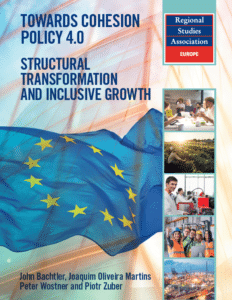RSA Policy Expo 2017: Towards Cohesion Policy 4.0: Structural Transformation and Inclusive Growth
Regional Studies Policy Impact Books, Volume 1, Issue 1 (2019)
Authors:
- Professor John Bachtler (Director, European Policies Research Centre, University of Strathclyde, United Kingdom)
- Dr Joaquim Oliveira Martins (Special Advisor to the Director, Centre for Entrepreneurship, SMEs, Regions and Cities, Organisation for Economic Cooperation and Development)
- Dr Peter Wostner (Expert working at the Government Office for Structural Policy, Slovenia)
- Dr Piotr Zuber (Faculty of Geography and Regional Studies, University of Warsaw, and Adviser and former Director of the Department of Structural Policy Coordination, Ministry of Economic Development, Poland)
As the debate on the direction of the EU and the post-2020 Multiannual Financial Framework intensifies, there are important questions about how the EU can best deploy its budgetary resources to meet the challenges facing the Union. The continuing effects of the financial, economic and migration crises are associated with reduced confidence and trust in democratic institutions and politicians, and a rise in populism, threatening the unity of the EU. A major cause is the unequal impact of globalisation and technological change on different parts of the EU.
A new paper prepared for the 7th Cohesion Forum argues that the EU not only needs to accelerate sustainable growth but also to resume convergence so that all parts of the EU are able to exploit the opportunities from the globalisation of trade and technological change. It proposes a new EU strategy for sustainable growth and structural transformation, setting out a common policy vision and a coherent framework for all EU policies – through regulatory reform, directly managed and territorial policies – with a collective focus on improving the ecosystems for structural change at different levels.
Cohesion Policy plays a crucial role in ensuring territorially differentiated policy support to promote structural transformation through innovation-oriented ecosystems at regional and local levels. The key principles of the 2013 regulatory reform need to be maintained but changes are needed to maximise opportunities to influence structural transformation, including: better coordination of funding instruments; recognition of the different territorial opportunities and challenges for frontier, intermediate and lagging regions; more emphasis on human capital; strengthened conditionalities; investment in capacity-building; and a significantly rationalised and differentiated implementation system.
To access this book, please click here.
Watch one of the authors, John Bachtler, describe the significance of the RSA Policy Impact book, Towards Cohesion Policy 4.0.
This report on post-2020 Cohesion Policy was written by John Bachtler, Joaquim Oliveira Martins, Peter Wostner and Piotr Zuber and published by the Regional Studies Association (RSA Europe). To download the report, please click here.
